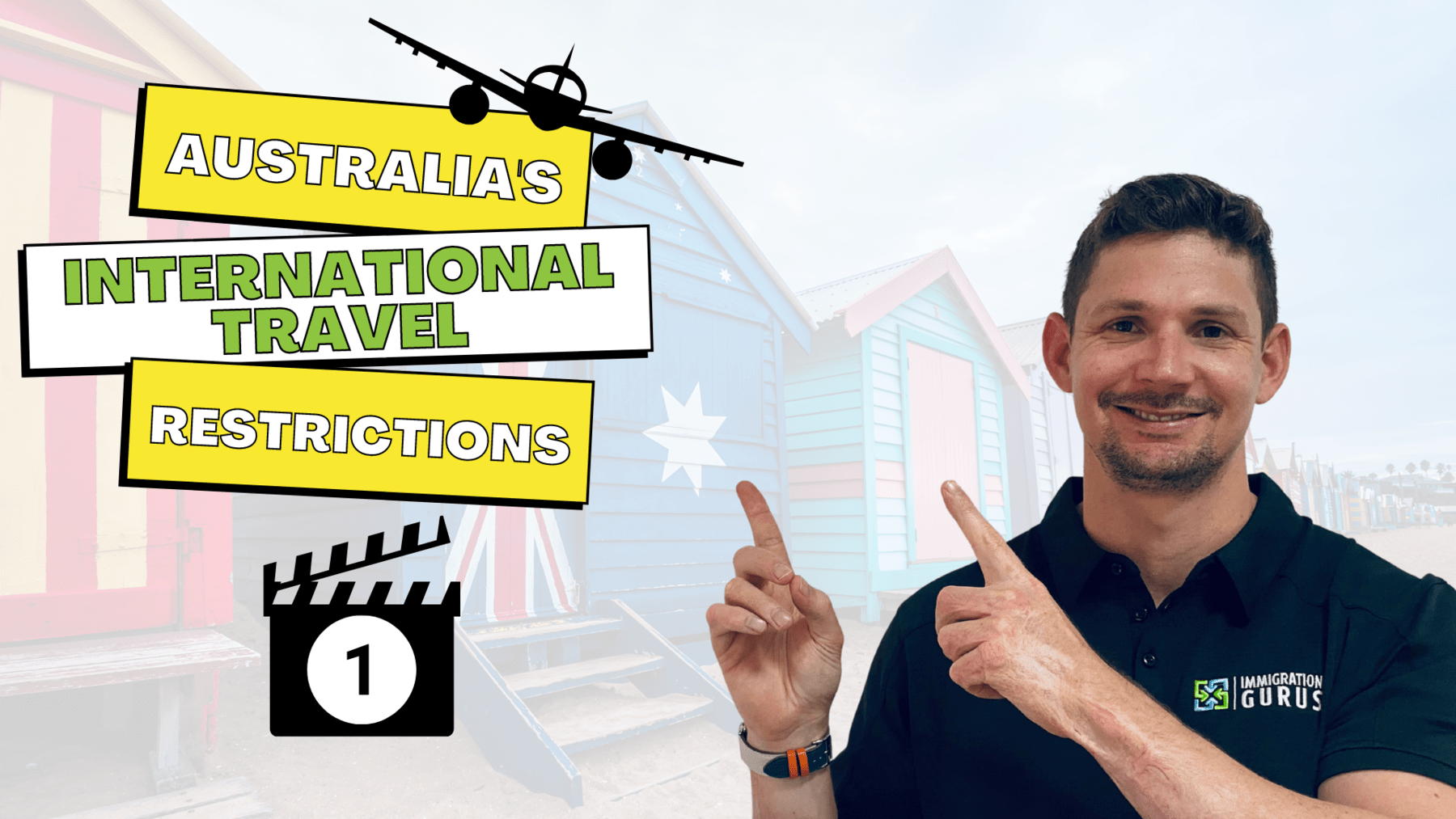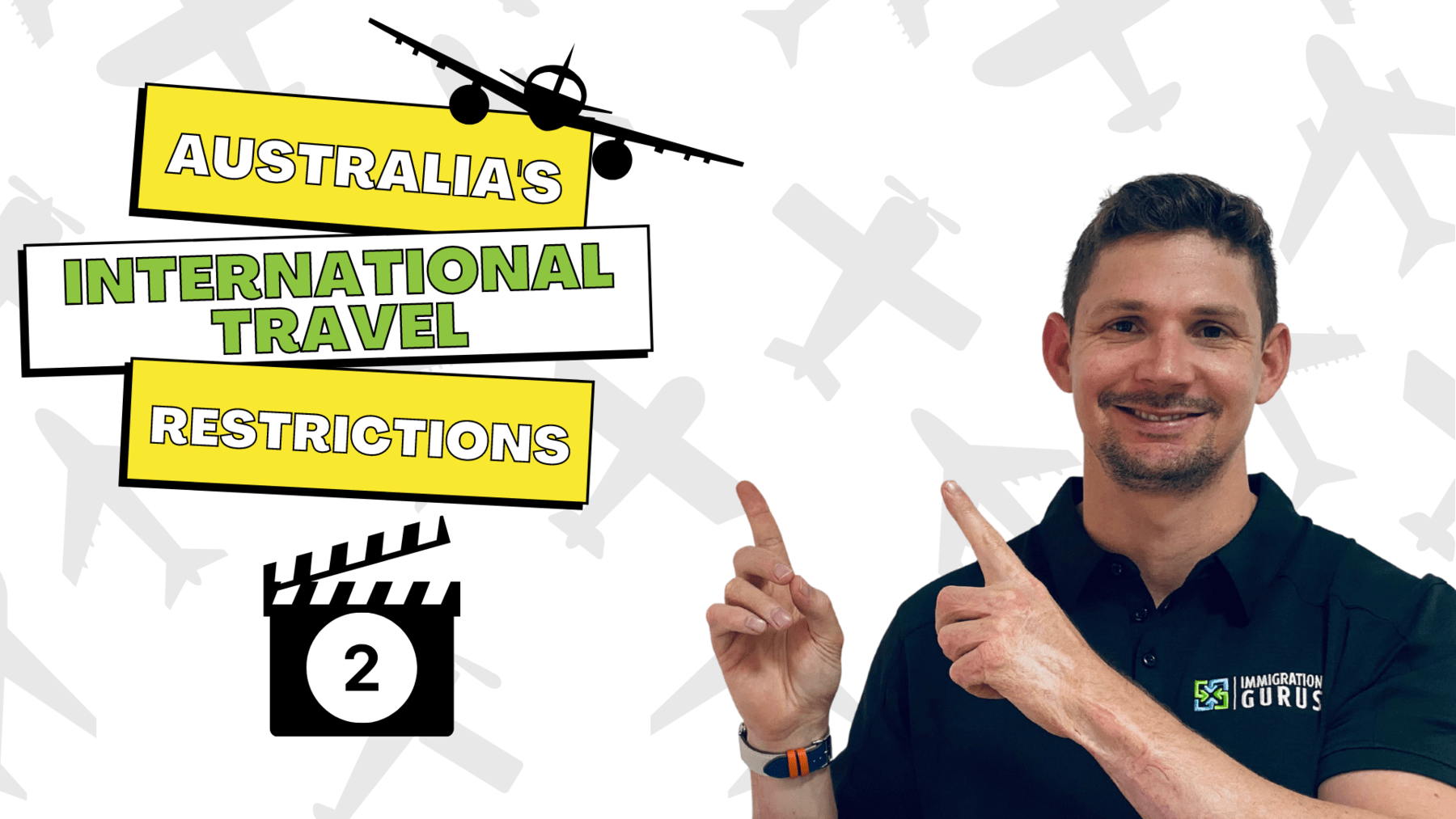Navigating your way through Australia’s current travel restrictions
Australia continues to impose strict border controls that limit the ability of many travellers to arrive in Australia. The following article answers some of the most common questions that are asked about Australia’s current travel restrictions.
Who can Automatically Travel into Australia?
You do NOT need to apply for an individual travel exemption if you are in one of the following categories:
- An Australian Citizen returning to Australia.
- A permanent Resident of Australia.
- The Immediate Family Member of an Australian Citizen or Permanent Resident
- You have been in New Zealand for 14 days or more before arriving by air in Australia.
Or you fall under a specific category such as a diplomat or Investment visa holder.
As an Exempt Traveller, what documents do I need to travel?
If you are automatically exempt from the travel restrictions, you will need to complete a travel declaration before travelling and provide a negative COVID test result at the time of check-in.
Other than flights from New Zealand all travellers will need to undertake 14 days of mandatory quarantine at a government approved facility
Who is considered an Immediate Family Member of an Australian?
Immediate Family Members include:
- Spouse
- De facto partner
- Child or
- Guardian
Of an:
- Australian Citizen
- Permanent Resident, or a
- New Zealand Citizen that usually lives in Australia
Parents, siblings or adult children are not considered immediate family. If you are the immediate family member of someone in Australia that holds a temporary visa you are not considered eligible.
How do I prove that I am an Immediate Family Member of an Australian?
You will need to hold a visa that already proves that you are an Immediate Family Member, such as a Partner Visa (820 or 309) or a Child visa (101, 102, 445). If you do not already hold such a visa you will need to apply for an Individual Travel Exemption
Unfortunately, if you hold a Prospective Marriage visa this is not considered to be a Partner Visa so you will need to apply for an Individual Travel Exemption before travelling to Australia.
How do I apply for a Travel Exemption as an Immediate Family Member?
If you are an immediate family member who holds a temporary visa other than a partner or child visa, you will need to submit your application for a Travel Exemption with the Department of Home Affairs. You will need to include documentary evidence to support your application.
This can include:
- a marriage certificate
- de-facto or civil partnership registration
- shared financial commitments
- joint residence arrangements
- or birth certificates
Who can apply for an Individual Travel Exemption?
You may be eligible to apply for a Travel Exemption if you are in one of the following categories:
- An immediate family member of an Australian citizen or resident and you hold a temporary visa or need to apply for a visa to travel.
- You have been invited by the Government if your entry is in the national interest or to assist with the COVID-19 pandemic.
- You have the critical skills required to maintain the supply of essential goods and services to Australia.
- You are sponsored by an employer to work in Australia in an occupation on the Priority Migration Skilled Occupation List such as Medical Practitioner, Software Engineer, Social Worker, Registered Nurse, etc.
- Military personnel.
- You have Government support as a student to complete years 11 & 12
- You are a student in the final 2 years of your study of medical, dental, nursing or other health professions university degree
- You have been granted a 300 Prospective Marriage Visa and lodged your 300 visa application at least 12 months before submitting your Travel Exemption.
You may also be eligible to travel to Australia for compassionate and compelling reasons. These include, but are not limited to, needing to travel because of the death or critical illness of a close family member, urgent or critical medical treatment in Australia, separation of a minor from their family unit etc.
What Documents do I need to Travel to Australia?
With the current international travel restrictions, if you want to travel to Australia you will need to:
- Hold a valid visa or have applied for one
- Have a travel exemption and supporting evidence
- Quarantine for 14 days upon arrival (unless arriving from New Zealand)
What is the process of applying for an Australian Travel Exemption?
You start by requesting the exemption online using the Travel Exemption Portal. You will need to apply for an exemption at least 2 weeks, but not more than 2 months before you are planning to travel.
You will need to create an account in the Travel Exemption Portal with a login and username. Once you have done this you will need to complete an online request form and provide information such as:
- Your reason for applying for exemption.
- Passport Details
- Evidence that you hold a valid visa or have applied for one.
- Your proposed Travel itinerary
Then depending on your situation, supporting documents such as:
- Marriage, birth, death certificates
- Proof of relationship or residence such as joint tenancy agreement, joint bank account etc.
- Letter from a doctor indicating why travel is necessary
Can Australian Citizens leave Australia automatically without a travel exemption?
Mentioned earlier in the blog Australian citizens and permanent residents are automatically exempt from travelling to Australia.
Unfortunately, that is not the case when citizens and permanent residents want to leave Australia. They can only travel outside Australia if they have been granted a Travel Exemption
As a Temporary Holder, do I have to apply for a travel exemption?
Temporary visa holders on the other hand, can automatically leave Australia. They do not need to apply for a travel exemption. The Australian Government encourages everyone to return home when it is possible to do so.
However, once they leave Australia, they will not be able to return while the travel and border restrictions are in place.
Australian citizens and permanent residents MUST apply for an Individual Travel exemption to leave Australia.
When would I be considered eligible to travel outside Australia?
As an Australian citizen or permanent resident, if you meet at least one of the following requirements you may be eligible to apply for a Travel Exemption if your travel is:
- Part of the response to the COVID-19 outbreak, including the provision of aid.
- For your business / employer
- To receive urgent medical treatment that is not available in Australia.
- For a compelling reason for three months or longer
- On compelling or compassionate grounds
- In the national interest
What evidence would I need to support my claim?
So, if your travel is because of one of these reasons, you may be considered eligible to travel.
However, you will have to provide evidence to support your claim. Here is what you need:
- Passport
- Marriage certificate
- Birth certificate
- Death certificate
- Proof of relationship (for example, shared tenancy agreement, joint bank account etc)
- Proof that you are moving to another country on a long-term basis such as leases, job offers and evidence your goods are being transported.
- Proof of your current valid visa, including in Australia and/or overseas.
- Letter from a doctor or hospital about any medical treatment/condition with statements on why travel is necessary.
- Letter from your employer, or other evidence that you are travelling for a business reason.
- Statement or evidence to show when you wish to return to Australia.
Plus, any other proof that you may think help your travel exemption request.
Would be I be able to leave Australia for longer than 3 Months?
Today we will also look a bit closer into citizens and permanent residents who are seeking exemption to leave Australia for three months or longer.
It is possible to leave Australia for more than 3 months ONLY if you have a compelling reason.
You must also provide evidence to support your claim. It is important to know that the evidence has to be provided in the form of Statutory Declaration. This declaration has to state that you are requesting the travel exemption on the basis that you intend to be absent from Australia for more than 3 months.
Some examples of evidence that you can include in your application:
- Confirmed flight itinerary – it’s crucial that your return date is at least 3 months after the departure date
- Confirmation of you leave from employment for 3 months
- Enrolment confirmation for study
- A doctor’s certificate to support your claim that you are travelling to provide care for sick family member
- Any other evidence that you think might support your request.
If you are an immediate family member who holds a temporary visa other than a partner or child visa, you will need to submit your application for a Travel Exemption with the Department of Home Affairs. You will need to include documentary evidence to support your application.
This can include:
- a marriage certificate
- de-facto or civil partnership registration
- shared financial commitments
- joint residence arrangements
- or birth certificates
Would I be able to travel if its not quite essential?
You should only travel if you have a compelling reason, and if it is essential that you travel now.
Keep in mind that it might not be that easy for you to return to Australia. There might be flight cancellations, delays, quarantine requirements in other countries etc.
You must ensure that you have sufficient funds to support yourself during you stay overseas in the event of any disruptions in your travel plans.
How long does it take to get approved and what do I do if the travel exemption wasn’t approved?
The majority of the travel exemptions to leave Australia are finalised within 48 hours, however some might take a bit longer depending on how complex your situation is. Keep in mind that you should only make one request per person. Duplicate requests will only cause delays.
Once your Travel exemption is granted, you will be able to leave Australia, but make sure to take all the evidence that you need with you to the airport.
If you are not granted the travel exemption you can apply again. You may need to provide additional documents and information and it is always a good idea to get some professional advice from a registered migration agent such as ourselves.
There is no limit to the number of times you can apply for the Travel exemption.
Who can quarantine-free travel?
Travellers who have been in either Australia or New Zealand for 14 days can travel by air between Australia and New Zealand quarantine-free, without the need to apply for a travel exemption?
The emphasis here is on ALL travellers. You do not need to be an Australian citizen or permanent resident to travel directly to and from New Zealand quarantine-free if you have been in either Australia or New Zealand for the 14 calendar days immediately before the date of your departure.
Do Australian Citizens and Permanent Residence need to apply for an outward travel exemption from New Zealand to another country?
There are some restrictions in place for Australian citizens and permanent residents if they have a booked onward flight from New Zealand to another overseas country.
Those Australian travellers will have to apply for an outward travel exemption.
It might not be as easy to come back to Australia because of the current travel restrictions and limited availability of flights.
What would I have to do upon returning back to Australia?
If you are an Australian citizen or permanent residents and are seeking to travel to another international destination from New Zealand and then wanting to return to Australia, you will have to:
- Present a negative COVID-19 test result (taken up to 72 hours before your departure to Australia)
- Do 14 days mandatory hotel quarantine at your own expense, and
- Be tested regularly while in quarantine.
What is required for me travelling back from New Zealand to Australia?
Before you travel to Australia you should complete the Australia Travel Declaration form at least 72 hours before your departure. This form will collect your contact & flight details, quarantine requirements and your health status.
Again, you will only need to apply for a travel exemption before you travel to Australia if you:
- Have been in New Zealand for less than 14 days before your planned departure
Or
- If you are travelling to Australia by sea and no air.
Once you arrive in Australia on a quarantine-free flight, you will be quired through a green zone to complete all border clearances.
If you have to quarantine – you will arrive in Australia on a red zone flight and will be guided to a red zone area from where you will be required to enter the 14 days mandatory quarantine.
If you have any questions about how to apply for a Travel Exemption feel free to Contact Us to talk to one of our Registered Migration Agents.





